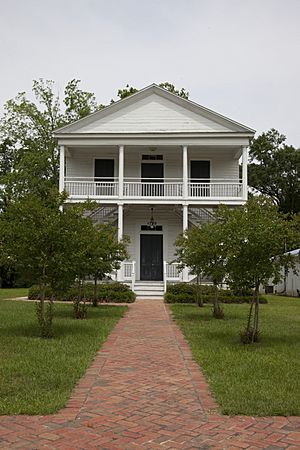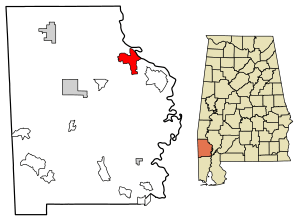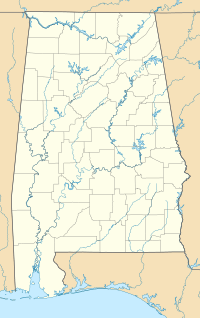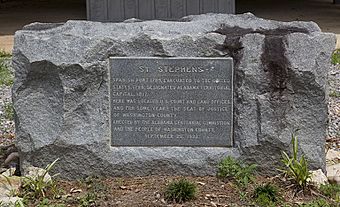St. Stephens, Alabama facts for kids
Quick facts for kids
St. Stephens
|
|
|---|---|
|
CDP
|
|

St. Stephens Courthouse in "New" St. Stephens, completed in 1854.
|
|

Location of St. Stephens in Washington County, Alabama.
|
|
| Country | United States |
| State | Alabama |
| County | Washington |
| Area | |
| • Total | 10.01 sq mi (25.93 km2) |
| • Land | 9.88 sq mi (25.58 km2) |
| • Water | 0.14 sq mi (0.35 km2) |
| Elevation | 226 ft (69 m) |
| Population
(2020)
|
|
| • Total | 415 |
| • Density | 42.02/sq mi (16.22/km2) |
| Time zone | UTC-6 (Central (CST)) |
| • Summer (DST) | UTC-5 (CDT) |
| ZIP code |
36569
|
| Area code(s) | 251 |
| FIPS code | 01-67584 |
St. Stephens is a small community in Washington County, Alabama, United States. It has a population of 415 people as of 2020. This area is located near the Tombigbee River, about 67 miles north of Mobile.
St. Stephens is actually made up of two different places: Old St. Stephens and New St. Stephens. Old St. Stephens is right on the river and is no longer lived in. It was once the capital of the Alabama Territory. Today, it's a historical park and is listed on the National Register of Historic Places. New St. Stephens grew up about two miles away, near a railway station. This is where you'll find the post office, churches, and homes today.
Contents
Population of St. Stephens
| Historical population | |||
|---|---|---|---|
| Census | Pop. | %± | |
| 1890 | 387 | — | |
| 2010 | 495 | — | |
| 2020 | 415 | −16.2% | |
| U.S. Decennial Census | |||
St. Stephens first appeared in the U.S. Census in 1890. At that time, it was listed as a small village. It was not counted again until 2010, when it was named a "census-designated place" (CDP).
History of St. Stephens
Old St. Stephens was built on a high limestone cliff. Native Americans called this spot Hobucakintopa. It was a special place because it was at the "fall line" of the Tombigbee River. This meant that large boats from Mobile could not travel any further north due to rocky areas.
Early Settlements
In 1789, the area was controlled by Spain. The Spanish governor of Mobile built a fort and outpost here. By 1796, about 190 white settlers lived around the fort. They also had about 97 African-American people who were forced to work for them. In 1799, after the American Revolutionary War, Spain gave the fort to the United States. This area became part of the Mississippi Territory.
In 1803, the Choctaw Federal Trading House was set up in St. Stephens. This was a place where Americans traded goods like tools and cloth for deerskins with the Choctaw people. George Strother Gaines was in charge of this trading post starting in 1805. He used the old Spanish buildings for the store and his home. In 1811, Gaines built what might have been the first brick building in Alabama.
A Growing Town
In 1807, the Mississippi Territorial legislature officially recognized St. Stephens as a town. By 1815, the town was surveyed, and land lots were sold. In 1816, there were about 40 houses in St. Stephens.
When the Alabama Territory was created in 1817, St. Stephens became its capital. This made the town grow very quickly. By 1819, St. Stephens had over 500 homes. It also had about 20 stores, two hotels, and even a theater!
Many important people lived in St. Stephens. One was Henry Hitchcock, who became the first attorney general of Alabama. The town also had a post office and a newspaper called the Halcyon and Tombeckbe Advertiser. Washington Academy, a private school for boys, was founded here in 1811. The Tombecbe Bank, the first bank in the state, was also started in St. Stephens.
Changes and Decline
In 1818, people started thinking the capital should be moved to a more central place in Alabama. In 1819, the capital was moved to Cahaba. This was a big blow to St. Stephens. Also, new boats were invented that could pass over the rocky areas in the river. This meant boats no longer had to stop at St. Stephens. On top of that, outbreaks of yellow fever caused many deaths in the town.
A new railway line was built, but it bypassed Old St. Stephens. A new station was built about two miles west of the river. Over the next 20 years, most people moved to the area around this new station, creating "New" St. Stephens. By the time of the American Civil War, Old St. Stephens was mostly empty.
Preserving History
The old site of St. Stephens was listed on the National Register of Historic Places in 1970. The St. Stephens Historical Commission was created in 1988. Its job is to study and protect the history of Old St. Stephens. They have received grants to map the old town site. They want to find where streets, buildings, and wells used to be.
"New" St. Stephens also has important historical buildings. The St. Stephens Courthouse is listed on the National Register of Historic Places. It has been restored and now serves as a visitor center and museum. The St. Stephens Methodist Church, built in 1857, is also an important historical building.
Notable Person
- Israel Victor Welch: He was a member of the Provisional Congress of the Confederate States from 1862 to 1865.
See also
 In Spanish: St. Stephens (Alabama) para niños
In Spanish: St. Stephens (Alabama) para niños



